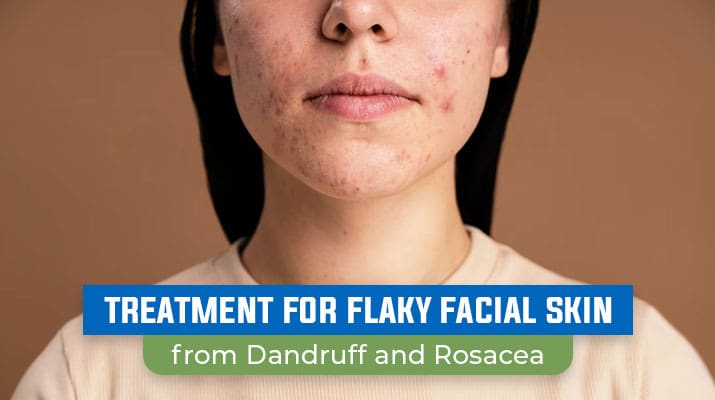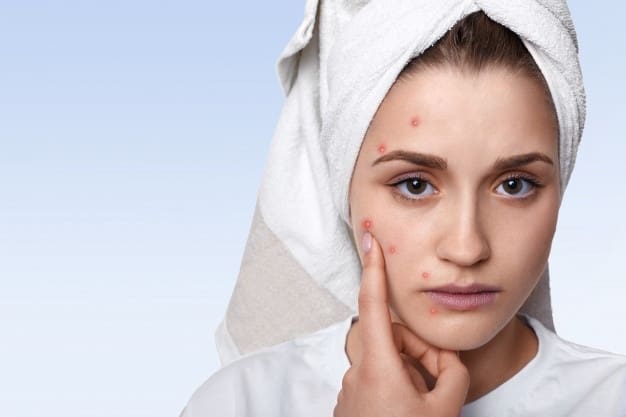Treatment for Flaky Facial Skin from Dandruff and Rosacea

Dandruff and Rosacea
Dry, flaky facial skin can be a frustrating and uncomfortable problem for many people, especially when it is caused by conditions like dandruff and rosacea. Dandruff is a common condition that affects the scalp, but it can also cause flaking and dryness on the face. On the other hand, rosacea is a chronic skin condition that causes redness, inflammation, and visible blood vessels on the face. Both conditions can lead to dry, flaky skin that is uncomfortable and unsightly.
Fortunately, several effective remedies are available for dry, flaky facial skin caused by dandruff and rosacea. In this blog, we’ll walk through several treatment options and what you can expect from each.
Different Skin Types
Our skin is our largest organ and serves as a protective barrier against the outside world. However, not all skin is the same. Different skin types require different facial skin treatments and care. Let’s take a look at the various skin types:
- Normal Skin
People with normal skin usually have smaller pores, a smooth texture, and a healthy glow. This is considered the most balanced skin type, with a good moisture and oil production balance. - Dry Skin
This skin type is characterized by a lack of moisture and oil production, leading to flakiness, itchiness, and a dull appearance. People with dry skin may also experience sensitivity to certain skincare products. - Oily Skin
This skin type is characterized by excess oil production, leading to a shiny appearance and larger pores. People with oily skin may also be more prone to acne and breakouts. - Combination Skin
Much like its name, combination skin is a combination of both oily and dry skin. People with combination skin usually have an oily T-zone (forehead, nose, and chin) and dry cheeks. - Sensitive Skin
This skin type is characterized by a tendency to react to certain skincare products and environmental factors, leading to redness, itching, and irritation. People with sensitive skin may also be more prone to conditions like rosacea.
Is Flaky Skin a Symptom of Rosacea?
Rosacea is a chronic condition that can cause a range of symptoms, including persistent redness, flushing, stinging, and burning sensations on the face. While dry skin with flaking is not a primary symptom of rosacea, it can be a common secondary symptom.
Rosacea is a complex condition that can manifest differently for different people. Some of the most common symptoms can be:
- Persistent facial redness
- Frequent flushing or blushing
- Stinging sensations
- Dry, flaky skin
- Thickening of the skin (Phymatous rosacea)
- Enlarging of the skin along the nose (Rhinophyma)
If you are experiencing rosacea symptoms, seeking help from a rosacea treatment center or dermatologist is important. They can provide a personalized facial skin treatment plan that addresses your specific symptoms and concerns. This may include prescription medications, topical treatments, and lifestyle changes that can help manage your symptoms and improve your overall quality of life.
Related Pages
- Treatment for Flaky Facial Skin from Dandruff and Rosacea
- Glytone
- Avene
- Microblading vs. Eyebrow Tattooing: What’s the Difference, and Why Does it Matter?
- Forehead Botox: Everything You Need to Know about the Cost, Risks, and Benefits
- Bellafill: A Long-Lasting, Effective Dermal Filler Solution
- Sebaceous Hyperplasia: Causes, Symptoms, and Treatment
- Laser Hair Removal: The Superior Alternative
- Neck Lift
- Wrinkle Treatment
- Molluscum
- Seborrheic Keratosis
- Mole Removal
- Actinic Keratosis
- Contact Dermatitis
- Itchy Scalp Treatment
- Atypical Nevi
- Hyperhidrosis Treatment
- Melasma Treatment
- Cysts Treatment
- Psoriasis
- Warts Treatment
- Eczema Treatment
- Seborrheic Dermatitis Treatment
- Rosacea Treatment
- Fungal Infections
- Hair Loss Treatment
- Acne Treatment
Quick Quote
Seborrheic Dermatitis Vs. Rosacea
Seborrheic dermatitis and rosacea are two common skin conditions affecting the facial area. While these two conditions may share some similarities, they have distinct differences in their symptoms and treatment options.
Rosacea is a chronic skin condition that can cause a range of symptoms, including:
- Persistent redness
- Stinging or burning
- Visible blood vessels
- Acne-like bumps.
People with rosacea may also experience facial flushing or blushing, which certain stimuli like heat, exercise, or spicy foods can trigger. While rosacea can affect anyone, it is more common in fair-skinned individuals and tends to develop in middle age.
Seborrheic dermatitis, on the other hand, is a common skin condition that affects the scalp and facial areas, especially around the eyebrows, nose, and ears. Its symptoms include:
- Scaly areas
- Itching or burning
- Greasy or yellowish patches of skin
- Dandruff.
Unlike rosacea, seborrheic dermatitis is not a chronic condition and tends to flare up periodically. Despite their differences, both conditions can be treated by a dermatologist or at a rosacea treatment center. Treatment options may include prescription medications, topical creams, and lifestyle changes.
How Do You Treat Flaky Skin?
Flaky skin can be an uncomfortable and unsightly problem, but there are steps you can take to manage and treat it. Here are some tips for how to treat flaky skin:
- Use a Gentle Cleanser
Harsh soaps and cleansers can strip your skin of natural oils and worsen flaking. Instead, opt for a gentle, fragrance-free cleanser that won’t irritate your skin. - Apply Moisturizer After Washing Your Face
Moisturizing your skin is essential for keeping it hydrated and preventing flaking. Look for a moisturizer that is formulated for your skin type and apply it after washing your face. - Use Room Temperature Water
Hot water can strip your skin of its natural oils, leading to dryness and flaking. Use lukewarm or room temperature water when washing your face to prevent further damage to your skin. - Use Gentle Exfoliants to Remove Flaking Skin
Exfoliating your skin can help remove flaking skin cells and smooth out your complexion. However, it’s vital to use gentle exfoliants to avoid further irritation. Look for products with natural exfoliants like oatmeal or sugar, or use a soft washcloth to gently buff away flaking skin. - Seek Medical Treatment
If your flaky skin persists or is accompanied by other symptoms like redness or itching, it’s essential to seek help from a skin treatment specialist or a dandruff treatment expert. They can help determine the underlying cause of your flaky skin and recommend appropriate treatment options.

Preventing Facial Dandruff
While seborrheic dermatitis can be difficult to cure completely, there are several ways to prevent dandruff from occurring. Here are some tips:
1. Wash Your Face Twice a Day
Keeping your skin clean and free of excess oil prevents facial dandruff. Be sure to wash your face twice daily, once in the morning and once at night, using a gentle, fragrance-free cleanser.
2. Follow Up with a Moisturizer After Cleansing
Moisturizing your skin after washing can help prevent dryness and flaking. Look for a moisturizer that is formulated for your skin type, and apply it liberally after washing your face.
3. Exfoliate Once or Twice a Week
Exfoliating your skin can help remove dead skin cells and prevent flaking. However, be sure to use a gentle exfoliant, as harsh scrubs can irritate your skin and worsen dandruff. Consider using a product with salicylic acid, which can help break down and remove excess oil.
4. Avoid Using Harsh Products
Harsh soaps, scrubs, and other skincare products can strip your skin of its natural oils and contribute to facial dandruff. Opt for gentle, fragrance-free products that are designed for sensitive skin.
5. Consider Seeing a Dermatologist
If you’re struggling with facial dandruff despite your best efforts, it may be time to see a dermatologist or a dandruff treatment specialist. They can help determine the underlying cause of your dandruff and recommend appropriate treatment options.
Need Professional Help for Rosacea or Seborrheic Dermatitis? Winston Salem Dermatology Is Just One Call Away!
Dealing with skin conditions like rosacea and seborrheic dermatitis can be challenging, but seeking professional help can make all the difference. At Winston Salem Dermatology, our team of experienced dermatologists can provide you with personalized treatment plans to help manage your skin condition and restore your skin’s health.
With our comprehensive range of cosmetic and medical treatments, we can help keep your skin feeling confident and rejuvenated. From topical creams to laser therapy, we have the expertise and technology to tackle a wide range of skin issues.
So, what are you waiting for? Don’t let skin conditions hold you back from feeling your best. Contact Winston Salem Dermatology today at (336) 774-8636 and take the first step towards healthy, beautiful skin!
Book your Consultation with Janet today! Call ☎ (336) 774-8636
Related Pages
- Treatment for Flaky Facial Skin from Dandruff and Rosacea
- Glytone
- Avene
- Microblading vs. Eyebrow Tattooing: What’s the Difference, and Why Does it Matter?
- Forehead Botox: Everything You Need to Know about the Cost, Risks, and Benefits
- Bellafill: A Long-Lasting, Effective Dermal Filler Solution
- Sebaceous Hyperplasia: Causes, Symptoms, and Treatment
- Laser Hair Removal: The Superior Alternative
- Neck Lift
- Wrinkle Treatment
- Molluscum
- Seborrheic Keratosis
- Mole Removal
- Actinic Keratosis
- Contact Dermatitis
- Itchy Scalp Treatment
- Atypical Nevi
- Hyperhidrosis Treatment
- Melasma Treatment
- Cysts Treatment
- Psoriasis
- Warts Treatment
- Eczema Treatment
- Seborrheic Dermatitis Treatment
- Rosacea Treatment
- Fungal Infections
- Hair Loss Treatment
- Acne Treatment
Quick Quote
Address
Winston Salem Dermatology & Surgery Center
1400 Westgate Center Drive,
Suite 200 - Winston Salem, NC 27103
Phone: 336.774.8636
Fax: 336.774.0265
www.WinstonSalemDermatology.com



